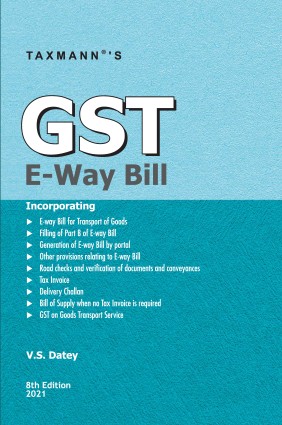E-way Bill for Intra-State Supplies is must from April 15 in 5 States
- Blog|GST & Customs|
- 2 Min Read
- By Taxmann
- |
- Last Updated on 15 December, 2025
GST E-Way Bill:
E-way bill is a document to be generated electronically by the supplier every time goods involve movement from one place to another. This mechanism is introduced in GST to ensure that the taxable goods are changing hands only after payment of GST. E-way Bill can be generated from the GST portal which requires information about the supplier, recipient, goods, location, etc. This compliance helps the Govt. to keep a track of the movement of goods and to check the tax evasion. An e-way bill has been bifurcated in two parts, Part A and Part B. Part A includes all the details related to the transported goods and invoice related details. Part B includes Vehicle Number in which the goods are being transported and the transport document number.
The requirement to generate an e-way bill is mandatory when the supply involves taxable goods and the value of a consignment exceeds Rs. 50,000. The responsibility of generation of an e-way will be on the supplier (consignor) or recipient (consignee). There is a provision in Rule 138(7) of the CGST Rules 2017 which provides that in case the consignor or consignee has not generated the e-way bill because the value of consignment is less than Rs. 50,000, the transporters are required to generate E-way bill if aggregate value of all consignment being carried in the vehicle is more than Rs. 50,000 in an inter-State supply. However, this provision of independently generating e-way bill by a transporter has been deferred for the time-being. From April 1, 2018, it is mandatory to generate the e-way bill for every inter-State movement of goods if the consignment value exceeds Rs. 50,000. However, for movement of goods within the State, i.e., Intra-State supply, it has been made operational from April 1, 2018 only in the State of Karnataka. The E-way bill is now made mandatory from April 15, 2018 for intra-State supplies in the states of, Andhra Pradesh, Gujarat, Kerala, Telangana and Uttar Pradesh.
Disclaimer: The content/information published on the website is only for general information of the user and shall not be construed as legal advice. While the Taxmann has exercised reasonable efforts to ensure the veracity of information/content published, Taxmann shall be under no liability in any manner whatsoever for incorrect information, if any.

Taxmann Publications has a dedicated in-house Research & Editorial Team. This team consists of a team of Chartered Accountants, Company Secretaries, and Lawyers. This team works under the guidance and supervision of editor-in-chief Mr Rakesh Bhargava.
The Research and Editorial Team is responsible for developing reliable and accurate content for the readers. The team follows the six-sigma approach to achieve the benchmark of zero error in its publications and research platforms. The team ensures that the following publication guidelines are thoroughly followed while developing the content:
- The statutory material is obtained only from the authorized and reliable sources
- All the latest developments in the judicial and legislative fields are covered
- Prepare the analytical write-ups on current, controversial, and important issues to help the readers to understand the concept and its implications
- Every content published by Taxmann is complete, accurate and lucid
- All evidence-based statements are supported with proper reference to Section, Circular No., Notification No. or citations
- The golden rules of grammar, style and consistency are thoroughly followed
- Font and size that’s easy to read and remain consistent across all imprint and digital publications are applied




 CA | CS | CMA
CA | CS | CMA

Comments are closed.